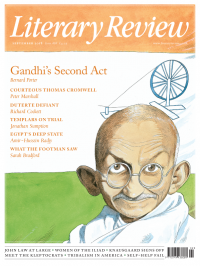Kevin Power
Down & Out in the Deep South
Lake Success
By Gary Shteyngart
Hamish Hamilton 338pp £16.99
As a theme, the decline of the privileged white male is a hardy perennial of the American novel. The rich white man may fall from the grace of youth (like Updike’s Rabbit Angstrom); he may crack up under the pressures of a bad marriage (like Bellow’s Moses Herzog); he may blunder into adultery and scandal (like Tom Wolfe’s Sherman McCoy); he may simply be crushed by the intersecting forces of family and capitalism (like Chip and Gary Lambert in Jonathan Franzen’s The Corrections). Whatever the cause, the rich white man is going down, and the story of his collapse will illustrate, for interested parties, the abysmal state of the American imperium as it follows the long and crooked path of postwar decline.
Gary Shteyngart’s fourth novel is a late and self-conscious addition to this subgenre. Shteyngart’s rich-white-man protagonist is Barry Cohen, ‘a man with 2.4 billion dollars of assets under management’. As an undergraduate, Barry had delusional literary ambitions (in a neat joke, he calls his hedge fund This Side of Capital). He is married to Seema, the daughter of Indian immigrants, who trained as an attorney but now devotes her energies to taking care of Shiva, Barry and Seema’s autistic son, who ‘had never said a word in his life’. The Cohens live in ‘one-percenter stability’ in a Manhattan skyscraper, the top three floors of which belong to Rupert Murdoch. Barry collects watches that cost tens of thousands of dollars: ‘Nomos was his new thing. They were not expensive watches, they topped out at 20K, but they were made in the tiny German town of Glashütte, far from all that overpriced Swiss razzle-dazzle.’ He is capable of thinking ‘There was something tender about poor people sleeping,’ and he owns a batch of Karuizawa whisky worth $33,000 a bottle.
Barry is also under investigation by the Securities and Exchange Commission for insider trading. His hedge fund is haemorrhaging clients. Humiliated at a dinner party by a Guatemalan novelist (who has designs on Seema), Barry collapses. Seized by the desire to reinvent himself – like the F Scott Fitzgerald characters

Sign Up to our newsletter
Receive free articles, highlights from the archive, news, details of prizes, and much more.@Lit_Review
Follow Literary Review on Twitter
Twitter Feed
The son of a notorious con man, John le Carré turned deception into an art form. Does his archive unmask the author or merely prove how well he learned to disappear?
John Phipps explores.
John Phipps - Approach & Seduction
John Phipps: Approach & Seduction - John le Carré: Tradecraft; Tradecraft: Writers on John le Carré by Federico Varese (ed)
literaryreview.co.uk
Few writers have been so eagerly mythologised as Katherine Mansfield. The short, brilliant life, the doomed love affairs, the sickly genius have together blurred the woman behind the work.
Sophie Oliver looks to Mansfield's stories for answers.
Sophie Oliver - Restless Soul
Sophie Oliver: Restless Soul - Katherine Mansfield: A Hidden Life by Gerri Kimber
literaryreview.co.uk
Literary Review is seeking an editorial intern.